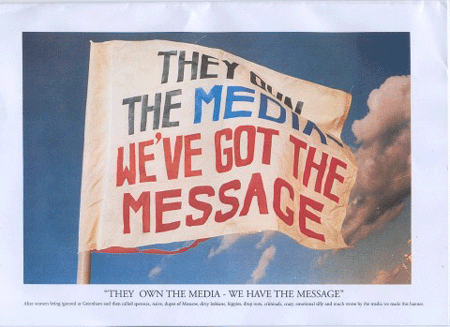All activist history is soaked in struggle, not just against the oppressive systems we set out to confront, but also internally, against the deep currents of sectarianism that fracture our own movements. The history of Greenham Common Women’s Peace Camp offers a vivid example. The colour-coded gates, yellow, red, blue, were more than navigation markers. They were flags of ideology, staking claims in this radical space, they were spreading stories. This was strength, it was a reflection of our tolerance: the ever-present bridging of views of ourselves as we build collective power.

And what is negative in this networked space? The same pattern, again and again. The loudest, most performative, and often the least effective people are the ones who tell the story. “Look at me,” they shout. “I was there. I led.” But where are the people who actually did the work? They’re still busy doing it. Quietly. Relentlessly. With their eyes on the issues, not on the spotlight. “Don’t look at me, I’m busy,” they say, trying to keep the fire alive.
The result is a warped memory. A messy, inaccurate activist history dominated by ego, not impact. And this distortion doesn’t only affect our understanding of the past, it shapes the strategies of the present and the futures we dare to imagine.
This problem doesn’t end with internal dynamics. Around every genuine social alternative, there gathers a familiar class, the parasites. These are not builders. They do not risk, they do not create. They arrive when the work is already done, when the energy is starting to rise, and they feed. They bring language, branding, metrics. They bring funding models. They bring institutional polish. And they bring rot.
This is the strong flow of #mainstreaming, the parasite class turns counter-currents into lifeblood for the dominant #deathcult, giving the reformist rebellion just enough edge, just enough cool to remain relevant. It does this because the mainstreaming, what we call the #deathcult, has little vitality of its own, being built on extraction, not creation.
And here lies the source of the recurring stress, that is present in every activist conversation worth having today. We don’t want the #deathcult to be healthy. We don’t want to be the raw material for its constant renewal. But how do we resist this co-option without collapsing into more sectarianism? How do we build spaces where the real work is visible and valued, without falling into the trap of ego?
This isn’t just about correcting the history books. It’s about reclaiming our stories so we can reclaim our strategies. If we don’t tell the truth of our movements, the parasites will. And they will use our truths as the next marketing campaign.

So, the challenge, we need to build cultures of memory and documentation that serve the work, not the egos. We need to resist the urge to pointlessly divide over differences when we could be multiplying our strengths. And urgently, we must recognize and mediate the damage parasites do, not with purity tests, more with clear boundaries and rooted values like the #4opens and #PGA hallmarks.
This is not about nostalgia, rather it’s about survival. It’s about #makeinghistory, the stories that keep the fire burning, not just for ourselves, but for everyone who still works for a better world,